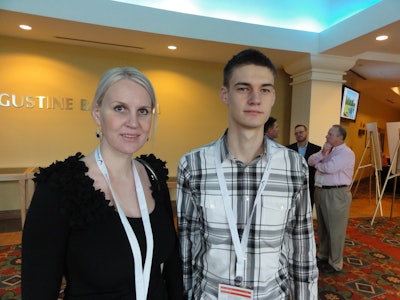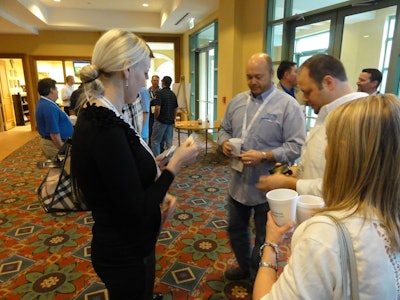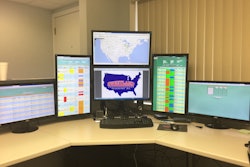The trucking industry has given many people an opportunity to start a business and achieve the American Dream. For motor carriers, the barriers to entry continue to rise and the dream may be getting out of reach for the next generation, especially in the truckload and less-than-truckload (LTL) market due to regulations and the cost of equipment and insurance.
By comparison, the entry point is much lower in the expedited freight marketplace. For at least one start up, the prospects seemed bright as its owners networked with like-minded entrepreneurs at the Sylectus user conference in St. Augustine, Fla., on Feb. 7-8.
 Milana Yuriychuck (left) and Paul Ilin attend the Sylectus user conference to grow their family-owned expedite business, Storm Logistics
Milana Yuriychuck (left) and Paul Ilin attend the Sylectus user conference to grow their family-owned expedite business, Storm LogisticsIn 1997, Pavel Ilin immigrated from Kazakhstan to Seattle, Wash., and began his trucking career in 2005 behind the wheels of a semitrailer. Four years later he moved his family to Boiling Springs, S.C., where he became a contractor for an expedited carrier, Bolt Express based in Toledo, Ohio, after buying a 2004 Dodge Sprinter with 500,000 miles.
In September, 2013, Ilin and his 18-year old son — also named Pavel — co-founded Storm Logistics after obtaining motor carrier and brokerage operating authority.
The son, nicknamed Paul, carries the title of general manager. Pavel, Sr. drives and is the boss, says Paul, who owns 50 percent of the company.
Starting a trucking company with one Sprinter van and growing it with contractors was really the only option at the time, he says, to be able to afford cargo and liability insurance. The next item on the agenda was to access the Alliance network.
The Alliance network, from Sylectus, is a protected load board that integrates with a web-based dispatch and transportation management system (TMS) from Sylectus. This unique integration enables Sylectus users to gain visibility to thousands of loads and trucks, to dispatch drivers – both their own and those that belong to other Alliance members – and to track shipments within a single platform.
Through integration with Omnitracs and other tracking systems, carriers and brokers using the Sylectus TMS have visibility of their dispatched loads to the final destination. Sylectus has 188 customers using its web-based TMS and the Alliance network in this integrated manner through a subscription level called Virtual Fleet Pro.
Although Sylectus users are direct competitors in the expedite arena, they also recognize the value of partnerships for sharing their capacity to cover time-sensitive loads. They also recognize the value of having access to more freight to grow their businesses.
At the user conference, Stu Sutton, president of Sylectus, said the Alliance network now has 14,000 trucks in the system and that the number of daily loads posted to the system climbed to a record high of 4,500 in January of 2014. Overall, load volumes are up by 45 percent year over year.
As for Storm Logistics, business looked pretty bleak before joining the Alliance network in December of 2013. Then, almost in an instant, its business took off in January. The company grew to 20 leased contractors with Sprinter, cargo vans and box trucks adding capacity to the Alliance network to bring in more revenue.
“If it wasn’t for Sylectus we would probably be out of business by now,” says Paul Ilin.
 Milana Yorichuk exchanges business cards with other members of the Alliance network at the Sylectus user conference
Milana Yorichuk exchanges business cards with other members of the Alliance network at the Sylectus user conferenceJanuary marked the first month in the company’s short history that it turned a profit. Paul’s sister, Milana Yoriychuk, became involved in the business as the dispatch manager. Because the Sylectus system is web-based, she can work from her home office in Atlanta or from any device with an Internet connection.
In the near future, Paul Ilin says the company plans to continue adding large and small straight trucks and hopes to one day expand into truckload and LTL. “By the next conference, if we continue to grow the way we grew last January, it is going to be good.”
Like other software user conferences, the value of the Sylectus event is the networking opportunities and learning how to operate more efficiently using the latest technology. But at Sylectus, the amount of networking leads directly to wealth creation.
“You don’t turn a profit the first day,” he says. “You have to earn your trust. I think if we stay in this system our growth will not just continue but will increase as more people get to know us. We go to the conference to meet more people and for them to be more familiar with us.”
Compared to other user groups and conferences in transportation, the attendees at the Sylectus conference appear more youthful and energized. Like the Ilen family, they are entrepreneurs looking to take advantage of a powerful trucking network.











